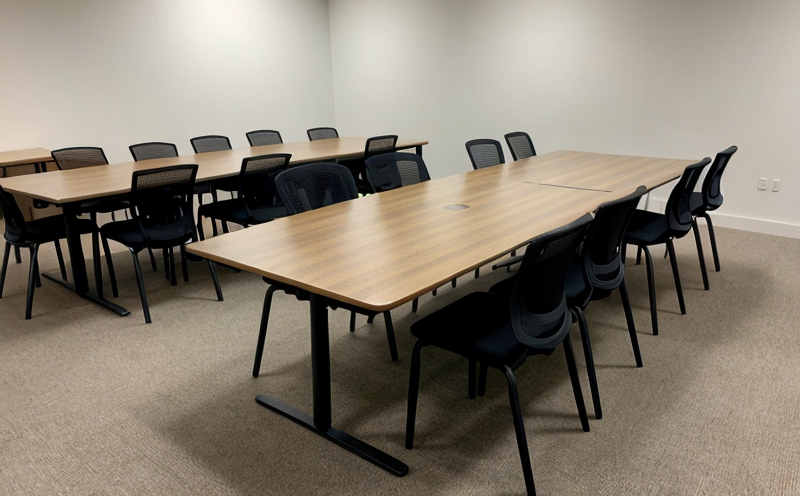NF EN 581-1 Outdoor Furniture Safety and Mechanical Testing of Tables
The European Standard NF EN 581-1 is a crucial document that specifies the requirements for ensuring the safety, durability, and mechanical integrity of outdoor furniture. This standard is particularly focused on tables and desks intended for use in public spaces or private gardens where they are exposed to various environmental conditions such as sunlight, rain, and varying temperatures.
Outdoor furniture, especially tables and desks, must withstand not only daily use but also the rigors of the elements over extended periods. The NF EN 581-1 standard aims to provide a comprehensive framework for manufacturers to ensure their products meet high safety standards. This includes testing for structural integrity, load-bearing capacity, stability under wind loads, resistance to moisture and UV radiation, and overall durability.
Testing is conducted using various methods that simulate real-world conditions. For instance, tables are subjected to static and dynamic loading tests to determine their ability to support expected weights without deformation or failure. Wind tunnel testing may also be performed to assess the stability of the furniture under windy conditions. Additionally, exposure chambers replicate outdoor environmental factors such as temperature swings and humidity levels.
The standard applies not only to new products but also to existing stock being sold in compliance with current regulations. Compliance is essential for manufacturers and retailers alike, ensuring that they meet legal requirements and protect end-users from potential hazards associated with poorly designed or constructed furniture.
Given the complexity of outdoor environments where these items are used, it's critical that manufacturers adhere strictly to NF EN 581-1 guidelines during production processes. Adherence ensures not only product longevity but also contributes significantly towards enhancing public safety by preventing accidents caused by unstable or structurally unsound furniture.
In summary, the NF EN 581-1 standard plays a pivotal role in guaranteeing the quality and safety of outdoor tables and desks used both commercially and domestically. By following its stringent requirements, manufacturers can produce robust products that are reliable under all conditions.
Why It Matters
The NF EN 581-1 standard is essential for several reasons:
- Safety Assurance: Ensures that outdoor furniture does not pose a risk of injury due to instability or structural failure.
- Durability: Helps manufacturers design products that can withstand harsh weather conditions and heavy use over time.
- Consumer Trust: Compliance with this standard builds confidence among consumers who purchase such items knowing they meet stringent quality benchmarks.
- Liability Protection: For businesses selling outdoor furniture, compliance shields them from potential legal issues resulting from defective products.
The standard's focus on safety and durability makes it indispensable for ensuring that outdoor tables and desks function correctly and safely in diverse environments. This is particularly important given the increasing popularity of public spaces like parks and gardens where such items are frequently used by large numbers of people.
Scope and Methodology
| Test Parameters | Description |
|---|---|
| Structural Integrity Test | Involves applying loads to the table to assess its ability to maintain structural stability under specified weight conditions. |
| Wind Load Stability Test | Determines how well the table holds up against simulated wind forces that could cause tipping or collapse. |
| Moisture and UV Exposure Test | Exposes samples to controlled environmental conditions mimicking outdoor exposure, including humidity and sunlight, to evaluate long-term durability. |
| Acceptance Criteria | Description |
|---|---|
| No visible deformation or cracks after testing. | The table should remain structurally sound and aesthetically intact post-testing. |
| All connections must maintain their integrity during loading tests. | Ensures that joints and fasteners are strong enough to handle expected stresses without failure. |
| No loss of stability under wind load conditions. | The table should remain upright and stable throughout the test, preventing any tipping or collapse. |
These tests cover a range of scenarios that outdoor furniture might encounter in real use. By adhering to these strict criteria, manufacturers can ensure their products are both safe and reliable for end-users.
Environmental and Sustainability Contributions
- Reduction in Waste: Compliance with NF EN 581-1 reduces the likelihood of premature failure leading to unnecessary replacement, thereby minimizing waste generation.
- Sustainable Materials Usage: Encourages the use of sustainable materials that are more resistant to environmental factors like UV radiation and moisture.
- Eco-Friendly Manufacturing Processes: Promotes energy-efficient manufacturing practices aimed at reducing carbon footprints associated with production processes.
- Promotion of Reusability: Ensured durability leads to longer product life cycles, promoting reuse rather than disposal after minimal use.
The emphasis on sustainability within this standard aligns well with global efforts towards greener practices and reduced environmental impact. By focusing on these aspects, the industry can contribute positively towards achieving more sustainable urban landscapes.





